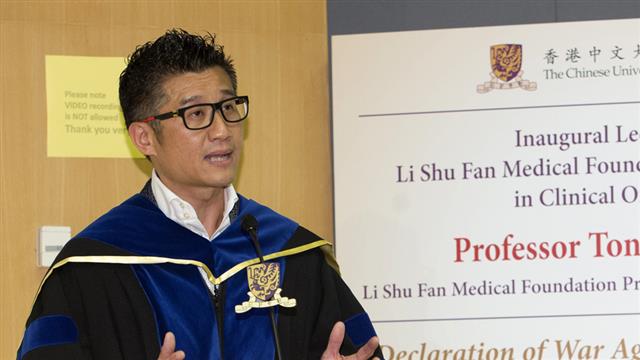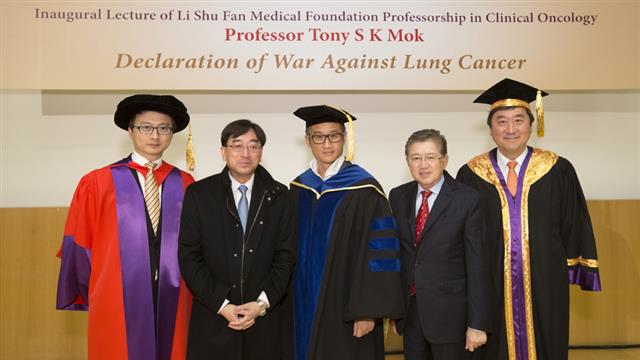Prof. Tony S.K. Mok, newly appointed Li Shu Fan Medical Foundation Professor of Clinical Oncology at The Chinese University of Hong Kong, delivered his inaugural lecture entitled 'Declaration of War against Lung Cancer' on 11 March.
Fighting cancer is like fighting a war. Unfortunately we have been losing the battle against lung cancer for many years. It all started in October 1492 when tobacco was first smoked by a lieutenant on Columbus's expedition. Its popularity was fanned by the manufacturing of cigarettes in 1902 and the promulgation of the corresponding advertisements. In 2011, global casualties from lung cancer amounted to one million. Only in recent years, with the development of molecular targeted therapy, have we begun to gain some ground in this tough fight. We are equipped with new weapons but the question now is how we can win the war. Ancient wisdom from Sun Tzu's The Art of War provides guidance: 'If you know the enemy and know yourself, you need not fear the result of a hundred battles.' For many decades we have wrongly addressed lung cancer as single entity illness: small cell lung cancer or non-small cell lung cancer. But that is not the full picture. By understanding the molecular profile of each individual lung cancer, we are capable of targeting the tumor successfully.
In the lecture, Professor Mok expounded the mechanism of molecular targeted therapy, which can be used to target the tumor by understanding the molecular profile of each individual lung cancer. The best example of this is the discovery of Epidermal Growth Factor Receptor (EGFR) mutation as a driver oncogene, and the establishment of EGFR Tyrosine Kinase Inhibitor (TKI). These discoveries, together with high sensitivity and specificity analysis of tissue and blood samples, could be used as the standard first line treatment for patients harbouring the mutation. The same concept is reconfirmed in patients with ELM4-ALK translocation mutation. With information of the specific genetic information, Professor Mok was able to conduct clinical trials with specific drug targeted for a mutation. The results have been encouraging. Professor Mok hopes to optimize treatment for patients with known driver oncogene by sophisticated detection, strategy on combination therapy and combating resistance.
Sun Tzu also taught that: 'Strategy without tactics is the slowest route to victory. Tactics without strategy is the noise before defeat.' There is little doubt that a lot of resources are being put into lung cancer research but even more are put into meeting regulatory requirements. Our progress could be greatly enhanced by reducing 'me too' and 'me better' discoveries and strategies, reviewing the philosophy behind clinical trials as well as revisiting regulatory guidelines so that more resources could be used in the discovery of novel treatment.
In this war against lung cancer, all parties with a stake in it including doctors, patients, families, advocates, researchers, pharmaceutical companies and governments must join hands and develop novel strategies in research and care delivery. In recent years, we have seen a lot more global collaboration towards this objective. Only with such an effort will we be able to take better care of our patients and come out as the victors.



